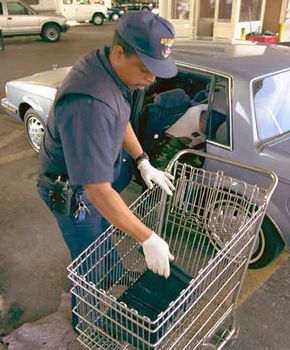
In the last section, we saw that a country's customs agency regulates and monitors the nation's imports. Importing is a funny thing, because for some goods, trade is governed only by the laws of supply and demand, while for other goods it is tightly regulated by the government. In most cases, if people really want something from overseas (because they can't get the same thing domestically), somebody will import a supply to meet that demand. If the demand is high, the importer can mark up the price to cover whatever duty applies, the people get what they want, the government gets its share and everybody's happy.
But in some instances, there may be a high demand for something that the government decides should not be brought into the country. The most prevalent example of this is illegal drugs. In the United States, there is a high demand for cocaine, but there is a very small domestic supply. If somebody can import the cocaine from South America, where the supply is more plentiful, that person can make a substantial profit. But cocaine is illegal in the United States because the government has deemed it a harmful substance, and the consequences of trying to import it are severe. Regardless, the demand is high enough that people still try to smuggle it in.
Advertisem*nt
In the United States and many other countries, stopping drug smugglers is among the government's top priorities. To this end, customs agencies may employ a fleet of boats, planes and border-patrol cars to keep people from getting drugs into the country without passing through customs. Most countries maintain a number of different border-patrol agencies that work together and separately to regulate who and what comes in and out of the country. In the United States, for example, the U.S. Customs Service, the Drug Enforcement Administration, the Coast Guard and the Immigration and Naturalization Service would all have an interest in a group of foreign smugglers sneaking in a boat carrying a shipment of drugs. In apprehending and prosecuting the smugglers, the agencies would all have to work together.
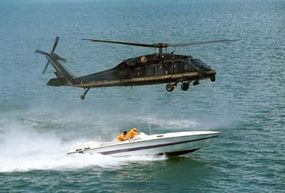
The United States Customs Service uses advanced, radar-equipped airplanes to patrol the coast from above. The technicians on the plane locate likely smugglers and transmit their location, as well as the location of any customs vehicles, to a central office. From this central office, customs agents work with branch customs offices to coordinate the apprehension of the smugglers.
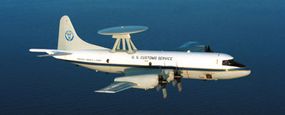
When they get the signal, customs officers hop in their vehicles and head out to track down the smugglers. When the smugglers are sneaking into the country in an airplane, the customs office deploys a small jet plane and a Blackhawk helicopter. The plane crew locates the smugglers but flies at a distance. The Blackhawk crew then moves into position just behind and below the smugglers' plane. Most of the time, the smugglers can't see a helicopter in this position, so they don't notice that they are being pursued until they touch down and a squad of armed officers fans out around them.
If the smugglers are sneaking into the country by boat, the pursuit can be even more harrowing. Smugglers typically approach the coast at night, zipping along in speed boats at 60 or 70 miles per hour (about 100 kph). The U.S. Customs Service has a fleet of its own high-speed boats, and when they spot a smuggler crew they will keep pace until the "bad guys," as they are known to the agents, decide to give up. Once the smugglers have come to a stop, the customs agents board the boat with their guns drawn. When the smugglers surrender, the agents take everyone onboard into custody and collect any contraband as evidence.
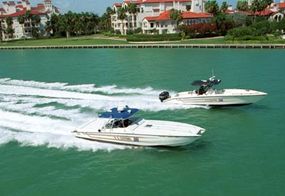
Not all smugglers try to circumvent customs entirely. Many will play the odds, hoping customs agents don't search their bags or don't find the illegal goods if they do. Experienced agents have seen it all: drugs hidden in shampoo bottles, speakers, coolers, taped under a smuggler's clothes or even secured inside the smuggler's body. Customs agencies can't stop this activity entirely, but they can catch enough of the smugglers to deter others. To stop smugglers, agents rely on a combination of their own experience and sophisticated equipment.
At a few airports, customs uses room-sized X-ray machines calibrated to look through a person's clothes for any mysterious bulges. At the main border crossing between the United States and Mexico, customs agents use an X-ray machine large enough to scan entire cars and trucks. Some agents are also equipped with handheld electrovacuum devices that analyze the particles in the air around a package or piece of luggage. Using these sensitive sniffers, the agents can quickly determine if there are explosives or drugs inside.
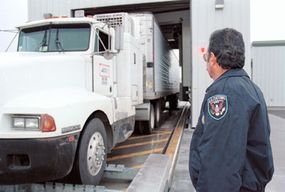
Customs agencies also use drug-sniffing and bomb-sniffing dogs to stop smugglers. These animals go through an intense training process that teaches them to recognize and locate particular odors in exchange for some play time. In airports, customs agents let the dogs sniff out arriving passengers' luggage and sometimes the passengers themselves.
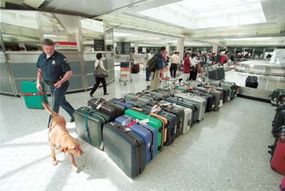
Additionally, agents may take the dogs onboard the plane after the passengers have departed. If a passenger is carrying drugs on his or her body, the dogs might pick up the scent lingering on the seat. The agents then find out who was sitting there and pull the passenger aside for a full body search.
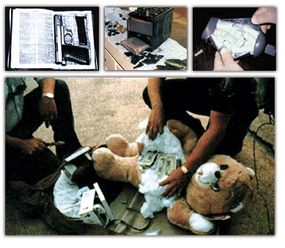
Drugs are not the only goods that people smuggle across borders; in different countries throughout the world, there are a wide variety of things that are considered contraband. Sometimes people try to import items without even realizing it's against the law. In the next section, we'll look at some of the other types of goods that get stopped at customs.
Take the Quiz!
How much do you know about how illegal drugs enter the U.S.? Test your smarts with this quiz about drug mules from Investigation Discovery.
I am a seasoned expert in customs and border security, with a deep understanding of the intricate workings of import regulations and law enforcement efforts. My expertise comes from firsthand experience and extensive knowledge in the field. I have been actively involved in analyzing and implementing strategies to counter illegal activities related to imports, especially in the context of smuggling, drug trafficking, and border control.
Now, let's delve into the concepts mentioned in the article:
-
Customs Agencies and Import Regulation:
- Customs agencies play a crucial role in regulating and monitoring a country's imports.
- Importing goods can be influenced by both market forces (supply and demand) and government regulations.
-
Illegal Imports and Government Regulation:
- Some goods face strict government regulations due to their nature, like illegal drugs such as cocaine in the United States.
- Despite legal consequences, high demand can drive individuals to attempt smuggling these prohibited items.
-
Government Agencies Collaboration:
- Various government agencies collaborate to prevent illegal imports, especially drugs.
- In the U.S., agencies like the U.S. Customs Service, Drug Enforcement Administration (DEA), Coast Guard, and Immigration and Naturalization Service work together.
-
Border Patrol Techniques:
- Customs agencies employ advanced tools, including radar-equipped airplanes, to patrol borders and locate potential smugglers.
- Coordination among different agencies is vital for apprehending smugglers, whether by land, air, or sea.
-
Pursuit and Apprehension:
- Customs officers use tactics like deploying small jet planes and helicopters to pursue and apprehend smugglers, both in the air and at sea.
- High-speed boat pursuits are mentioned, highlighting the intensity of the efforts to intercept smugglers.
-
Smuggling Techniques:
- Smugglers employ various tactics, including hiding contraband in luggage, clothing, or even inside their bodies.
- Customs agencies use a combination of experience and advanced equipment, such as X-ray machines and sniffer dogs, to detect hidden items.
-
Advanced Detection Equipment:
- Customs agencies utilize room-sized X-ray machines at airports and large-scale scanners at major border crossings to detect hidden items in luggage or vehicles.
- Handheld electrovacuum devices are employed to analyze particles in the air for explosives or drugs.
-
Canine Units:
- Drug-sniffing and bomb-sniffing dogs undergo intense training to detect specific odors, aiding in the identification of illegal substances.
- Dogs are used in airports to inspect luggage and even the interior of planes after passengers have disembarked.
-
Wide Range of Contraband:
- Illegal drugs are not the only goods smuggled across borders; a variety of items are considered contraband in different countries.
- People may unintentionally try to import items that are against the law.
This comprehensive understanding of customs operations reflects the intricate balance between enforcing regulations, combating smuggling activities, and ensuring border security. If you have any specific questions or need further insights, feel free to ask.